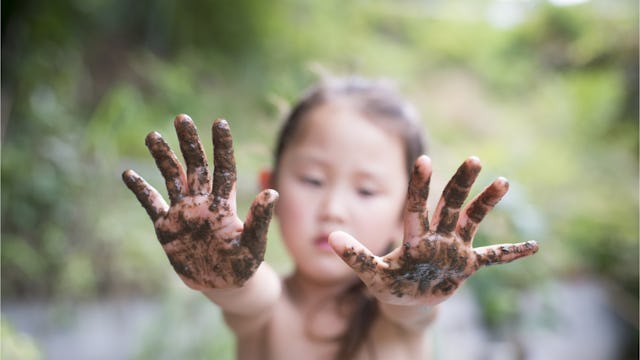Science Says We Need To Chill Out — Germs Are Good For Our Kids

I grew up on a beef farm in central Utah, so dirt, mud, grass, and manure were all a big part of my childhood. If someone didn’t get dirty, then we really didn’t have a good time. This was in the ’80s. Obviously things have changed now.
I have three children, and we don’t live on a farm. We live in a neighborhood in a rural town. My kids don’t get all that dirty. In fact, they’d probably be more likely to play a video game of a child getting dirty then actually handle dirt. I will admit, though, for the longest time I didn’t really think much about how dirty my kids were. I mean, don’t get me wrong. Telling my 10-year-old son to take a shower is like asking him to climb inside an iron maiden, but I fight that battle nightly. I also check my 7-year-old daughter’s toothbrush to make sure it’s wet after she proclaims to have brushed her teeth.
For 2017, my kids are pretty normal when it comes to cleanliness, but they don’t really get in the dirt. According to Jack Gilbert, a scientist who studies microbial ecosystems at the University of Chicago and author of Dirt Is Good, my children need more dirt in their lives to help them fully develop a strong immune system.
During a recent interview with NPR, Gilbert answered a number of questions about the benefits of your children coming into contact with germs. In fact, he feels the biggest mistake most parents make is to over-sterilize their child’s environment. So for example, when my 3-year-old goes into the backyard and gets a little muddy, my immediate reaction is to take her in and wash her off. But Gilbert says that’s not the best idea because it keeps children from exposure to germs that can really boost their immune system.
The same can be said about pets. Gilbert had this to say about children playing with the family dog: “It’s fine to wash their hands if there’s a cold or a flu virus around, but if they’re interacting with a dog, and the dog licks their face, that’s not a bad thing. In fact that could be extremely beneficial for the child’s health.” Dogs lick their butts, so it might take some time for me not to reflexively balk at my kid getting licked in the mouth, but I’m glad there’s some benefit to that experience.
He also had a lot to say about the pacifier. According to him, the five-second rule is a myth, but that doesn’t mean that you shouldn’t slap that pacifier back in the kid’s mouth after it touches the ground. In fact, he mentioned a study of more than 300,000 children that showed that parents who “licked the pacifier and put it back in — their kids developed less allergies, less asthma, less eczema. Overall, their health was stronger and more robust.” I will admit that I’ve seen this done. Luckily, my family is past the pacifier stage because I’m not about to stick a dirty pacifier in my mouth regardless of how beneficial it is to my child’s immune system.
And hand sanitizer? Gilbert isn’t a fan. He recommends soap and warm water because it is less damaging to your child’s overall health.
On the whole, Gilbert’s advice is this: Unless there’s a virus going around, or something that contains serious bacteria, let your children get dirty. Stop worrying about it. So, for example, last weekend when my 3-year-old picked up dog poop in my front yard and smeared it on her older sister, I was in the right to rush them both inside and clean them off. But if it had been dirt, I’d have been overreacting.
Gilbert’s study is part of a new push for parents to allow children to get dirty. For example, a recent study performed at the University of Iowa examined how 16-month-old children develop language skills from nonsolid objects such as oatmeal and glue. What they found is that if you put a toddler in a familiar setting — for this study they used the high chair — and give them nonsolids, they learn the names of nonsolids faster. Sensory exploration, which almost always involves getting messy, is invaluable for kids.
So what does this mean for parents? I think it means, for most of us, that we can take it down a level. We don’t have to be on “dirty kid” watch all the time. We don’t need to be lathering our children down with hand sanitizer 24/7. And we don’t need to feel bad for picking up that dirty pacifier and slapping it back in our child’s screaming mouth. Kids are built to get dirty. They enjoy it.
According to Gilbert’s research, not getting dirty can cause immune system problems down the road. As a father of three, I get the struggle. I feel like I’m doing something wrong when my children are covered in dirt and grime. But clearly, I need to chill out a bit, and let them enjoy themselves before I worry about how I’m going to clean them off so they don’t track dirt through the entire house.
Gilbert ended his interview with NPR on this note, and I think it really puts his argument for a dirty childhood into perspective: “[G]enerally, allow your kid to experience the world. As long as they’re properly vaccinated, there’s no threat, and they will actually get a stronger, more beneficial exposure.” This is something I need to work on, clearly. I need to chill out. Not just for their health benefits, but for mine too.